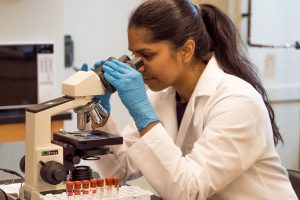Working in histopathology: 5 pros and 5 cons
This page is mainly written for medical students and junior doctors – for those who are considering a career in Histopathology, to those who have never heard of the speciality!
Histopathology is a really hidden career that many students don’t know about so this article will let you know some of the pros and cons!

Pros
1. Constant learning and intellectual stimulation. Histopathology is such a diverse speciality so you are always learning and seeing new pathologies. You need knowledge of anatomy, pathology, surgical techniques and clinical management and this variety provides great interest and challenge.
2. Varied workload. The days are usually spent doing a mix of reporting cases, trimming specimens in the laboratory (with biomedical science colleagues) and attending multi-disciplinary team meetings with radiologists, surgeons and other colleagues.
3. Social hours and good work life balance. Histopathology generally has no required weekend or night work so it is fantastic for maintaining a good work-life balance. There is also often the opportunity to pick up extra locum work as a consultant to help tackle work backlogs. And with more work in the UK becoming digital, there is increasing opportunity to work from home.
4. Managing your own time. Pathologists can largely manage their own time and workload which gives some degree of flexibility when working. Additionally there is time to build in research and teaching into the job.
5. Exciting and diverse developments in the field. Histopathology has seen recent growth in molecular testing (bringing cancer genomics into the field), digital pathology, and artificial intelligence which are all exciting areas and novel fields for histopathologists to be involved with.
Cons
1. Lack of patient contact. Undeniably this may be a big con for some people as histopathologists have very little to no patient contact. Most histopathologists though do report feeling connected enough to patient care by knowing their reports are critical to patient decisions and management.
2. High level of responsibility. The diagnoses made by histopathologists can lead to major treatment decisions for patients. This coupled with a high workload can lead to high pressure and stress at some times.
3. Self-motivation. High levels of self-motivation are required as a trainee and consultant to learn, keep on top of new information and manage the high volume of work.
4. The work environment. Although there are times where histopathologists work with other colleagues, attend meetings or are in the lab (as above), a large volume of the work is sedentary, reporting time alone which may not suit certain people.
5. Post mortem examinations. There is still a requirement to do post-mortem examinations in the first 2 years of training, which some people may not want to do.
Summary
We have a described working in histopathology: 5 pros and 5 cons. We hope it has been useful.
This article was written by Dr Harriet Evans, Registrar in Pathology

